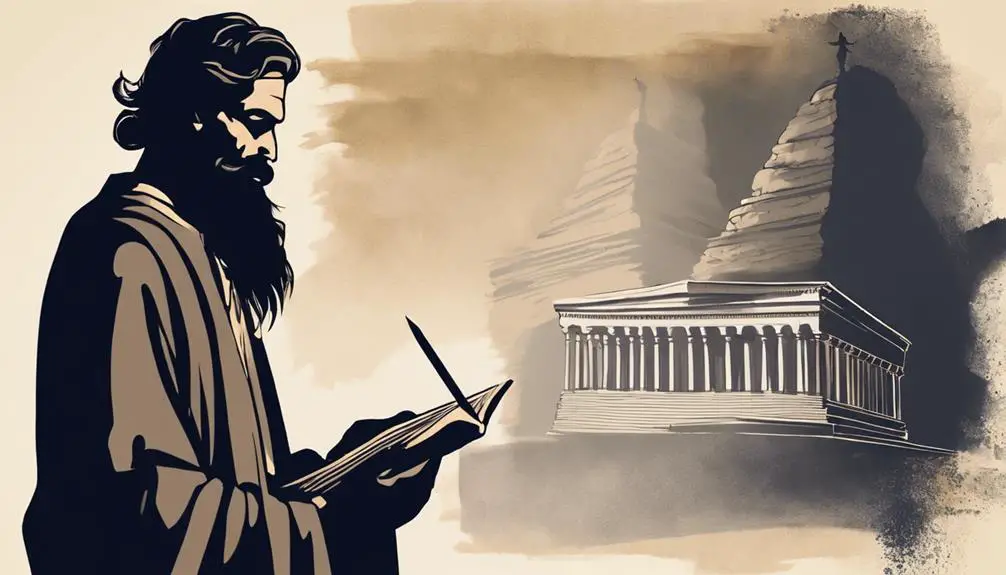Hidden within biblical texts, Shemaiah's divine messages shaped kingdoms—discover the enigmatic prophet who influenced history's course.

Shemaiah in the Bible
Navigating the intricate tapestry of biblical figures, you'll find Shemaiah, a thread interwoven with mystery and divine messages. As a prophet during King Rehoboam's reign, his story is more than a footnote in Israelite history—it's a window into the complexities of prophetic roles and their impacts.
His warnings and the actions that followed offer a rich field for exploration, especially considering the weight of his words on the course of events. Why did his messages hold such gravity, and what can they teach us about the broader narrative they're part of?
Uncover the layers behind this intriguing figure, and you might find more than historical insights.
Key Takeaways
- Shemaiah was a multifaceted biblical figure known for his roles as a prophet, advisor, and intermediary.
- He delivered critical messages and warnings from God, influencing the moral and spiritual direction of Israel.
- Shemaiah's guidance to leaders significantly impacted Israel's political and spiritual landscape, fostering a culture of accountability.
- His legacy is a testament to the enduring power and influence of prophetic voices in shaping societal values and ethics.
The Identity of Shemaiah

Shemaiah, a figure mentioned in the Hebrew Bible, holds a multifaceted identity that spans roles as a prophet, advisor, and intermediary in various narratives. His presence across different contexts and stories has led to considerable genealogical confusion and name variations, complicating efforts to trace his lineage and understand his place within the broader biblical history.
Genealogical confusion arises primarily from the multiple individuals named Shemaiah mentioned throughout the scriptures. This commonality in names has led scholars to meticulously distinguish between these figures based on their familial ties, roles, and the periods in which they lived. However, the task is daunting due to the sparse and sometimes overlapping information provided.
Additionally, name variations add another layer of complexity. The Hebrew Bible, having been translated across several languages and cultures, exhibits slight differences in the spelling and pronunciation of names. As a result, Shemaiah's identity becomes even more enigmatic, requiring scholars to cross-reference historical and linguistic sources to accurately place him within the biblical narrative.
This blend of genealogical confusion and name variations underscores the challenges in fully understanding Shemaiah's identity and contributions. It highlights the need for cautious and thorough examination of biblical texts to unravel the intricacies of his character.
Shemaiah's Prophetic Role
Amidst the complexities of his identity, one clear aspect of Shemaiah's role in the Hebrew Bible is his significant contributions as a prophet. His involvement in the narratives showcases a unique blend of divine communication and prophetic accuracy, setting him apart as a pivotal figure.
To understand Shemaiah's prophetic role, consider these key points:
- Divine Communication: Shemaiah serves as a conduit for divine messages, emphasizing the importance of direct communication between the divine and humanity.
- Prophetic Accuracy: His prophecies are notable for their precision and fulfillment, underscoring the reliability of his messages.
- Guidance to Leaders: Shemaiah often directs and advises kings and leaders, highlighting the prophet's role in guiding the nation's direction.
- Social Influence: Through his prophecies, Shemaiah exerts a considerable influence on the social fabric of his time, shaping events and public opinion.
- Spiritual Authority: His ability to convey divine will grants him a position of spiritual authority, reinforcing the significance of prophecy in religious practice.
Shemaiah's role as a prophet is thus integral to understanding his impact and the broader narrative of the Hebrew Bible. His contributions underscore the critical role of prophets in mediating divine communication and guiding their communities.
Key Messages and Warnings

Delving into the core of Shemaiah's prophetic messages reveals a tapestry of warnings and directives aimed at steering the nation towards divine will. You'll find that Shemaiah's communications aren't mere historical footnotes; they serve as critical intersections where divine intervention intersects with human history, guiding the people through moral and spiritual quandaries. These messages, rich in divine wisdom, act as a moral compass for the nation, pointing towards righteousness and away from the peril of disobedience.
Shemaiah's warnings are particularly poignant, underscoring the consequences of straying from prescribed divine paths. His role as a conduit of divine will highlights the importance of adherence to spiritual laws as a means of avoiding calamity. Through his narratives, one discerns the clear message that divine intervention isn't only a mechanism of deliverance but also a tool for correction.
Analyzing these directives, it's evident that Shemaiah's prophetic utterances were instrumental in shaping the moral and ethical framework of his time. They underscore the perpetual relevance of divine guidance in navigating the complexities of governance and personal conduct. In essence, these messages from Shemaiah serve as timeless reminders of the significance of aligning one's actions with a higher moral and spiritual order.
Impact on Israelite History
The prophetic interventions of Shemaiah wielded a profound influence on the trajectory of Israelite history, shaping its moral and spiritual landscape. Through his divine messages, Shemaiah not only addressed the immediate political crises but also instigated broader cultural shifts that reverberated through the annals of Israelite governance. His role as a mediator between the divine and the people underscored the quintessential balance between spiritual adherence and political pragmatism.
Here are key aspects of his impact:
- Guided Israelite leaders, steering them towards decisions that prioritized communal welfare over personal gain.
- Fostered a culture of accountability, urging rulers and citizens alike to uphold their covenant with God.
- Played a pivotal role in the diffusion of prophetic messages, contributing to the spiritual education of the populace.
- Advocated for justice and equity, influencing the moral compass of society.
- Impacted legislative reforms that aligned with ethical and religious principles, ensuring that governance reflected divine ordinances.
In essence, Shemaiah's contributions were fundamental in navigating the complex interplay between divine will and human agency, leaving an indelible mark on the evolution of Israelite society and its governance structures.
Reflecting on Shemaiah's Legacy

Reflecting on Shemaiah's legacy requires understanding how his prophetic insights fundamentally redefined Israel's spiritual and political landscapes. His role as a prophet, particularly during the reign of Rehoboam, showcases a critical juncture in Israelite history where divine guidance intersected with human governance, leading to significant shifts in societal norms and values. Modern Interpretations of Shemaiah's actions and prophecies offer a rich tapestry of analysis, highlighting his contributions to the development of Jewish thought and ethics.
Delving deeper into Shemaiah's narrative, one discovers Ethical Lessons that resonate with contemporary issues of leadership, responsibility, and the consequences of ignoring wise counsel. His admonitions against Rehoboam's proposed military campaign to reconquer the northern tribes underscore a timeless principle of seeking peaceful resolutions over conflict, emphasizing the importance of wisdom and restraint over rash actions.
In academic discourse, Shemaiah's legacy is often examined through the lens of his influence on subsequent generations, both in terms of political theology and moral philosophy. His life serves as a testament to the enduring power of prophetic voice in shaping society's moral compass, reminding readers of the profound impact that principled leadership can have on the course of history.
Frequently Asked Questions
How Does Shemaiah's Relationship With Other Biblical Figures, Such as King Solomon or Jeroboam, Shed Light on His Character and Motivations?
By examining interactions with figures like Solomon and Jeroboam, you gain insights into the motivations driving certain actions. Solomon's wisdom, often highlighted, contrasts sharply with Jeroboam's rebellion, shaping perceptions of loyalty and dissent.
This dynamic reveals the complexities of political and spiritual leadership, offering a deeper understanding of character motivations. Analyzing these relationships critically, you uncover the nuanced roles played in historical and religious contexts, enriching your comprehension of their significance.
Are There Any Archaeological Findings or Historical Records Outside the Bible That Corroborate Shemaiah's Existence and Actions?
You're exploring the intersection of archaeological debates and historical verification.
Imagine you're examining an ancient inscription, believed to confirm the actions of a historical figure.
In this context, when you delve into the existence and deeds of figures like Shemaiah, evidence outside biblical accounts is scarce. Archaeological findings or historical records that directly corroborate his existence and actions are limited, leading to ongoing scholarly discussions and a careful analysis of available data.
How Has Shemaiah's Story Been Interpreted in Jewish, Christian, and Islamic Traditions, and What Variations Exist in These Interpretations?
In your exploration of Shemaiah's story, you'll find it ripe for interfaith dialogue. Conduct a comparative analysis across Jewish, Christian, and Islamic traditions, noting the unique interpretations and variations that exist.
Each tradition offers a distinct lens, enriching your understanding significantly. Delve into how these perspectives converge and diverge, providing a broader, more nuanced view of Shemaiah's narrative and its significance in religious and historical contexts.
What Are the Linguistic Origins and Meanings of the Name Shemaiah, and How Does This Reflect on His Role or Personality as Depicted in the Bible?
Diving into the name's etymology, you'll find 'Shemaiah' weaves a rich tapestry of personal significance. It's a beacon, illuminating his role and personality with its meaning, 'Heard by God.'
This linguistic treasure chest not only highlights his divine connection but also, through scholarly analysis, reveals layers of his character. As you dissect its origins, you'll uncover how profoundly a name can mirror one's destiny, painting a vivid picture of his biblical narrative.
How Do Modern Theologians and Biblical Scholars Reconcile the Actions and Prophecies of Shemaiah With Contemporary Understandings of Ethics and Prophecy?
You're exploring how scholars today approach the ethical paradoxes and prophetic authenticity in ancient texts. They delve into historical contexts, comparing ancient norms with today's ethical frameworks. This analysis helps reconcile actions and prophecies once considered standard with contemporary ethics.
Scholars use a mix of theological critique and historical understanding to navigate these complexities, ensuring interpretations remain relevant while respecting the text's original context and its impact on modern ethical and prophetic discussions.
Conclusion
As you explore the annals of biblical history, you might find it fascinating how Shemaiah's presence coincides with pivotal moments in Israelite history. Analyzing his contributions, you'll see how his warnings and messages, rooted in divine insight, significantly impacted the nation's trajectory.
His legacy, a blend of prophecy and political influence, underscores the complex interplay between faith and governance in ancient times. Reflecting on Shemaiah's role offers a unique lens through which to understand the multifaceted nature of leadership and divine intervention in biblical narratives.



Sign up